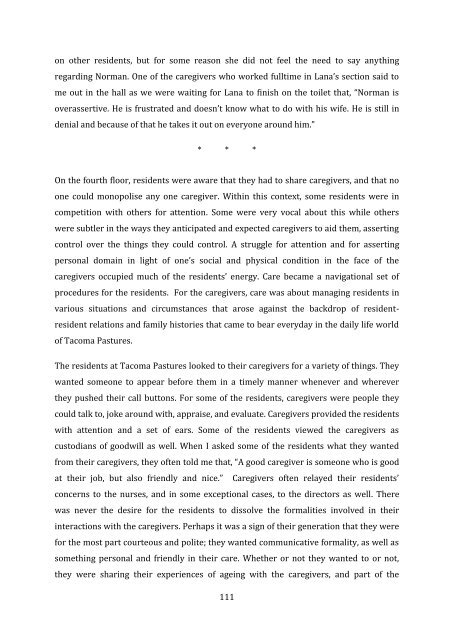Philip Y. Kao PhD thesis - Research@StAndrews:FullText
Philip Y. Kao PhD thesis - Research@StAndrews:FullText
Philip Y. Kao PhD thesis - Research@StAndrews:FullText
Create successful ePaper yourself
Turn your PDF publications into a flip-book with our unique Google optimized e-Paper software.
on other residents, but for some reason she did not feel the need to say anything<br />
regarding Norman. One of the caregivers who worked fulltime in Lana’s section said to<br />
me out in the hall as we were waiting for Lana to finish on the toilet that, “Norman is<br />
overassertive. He is frustrated and doesn’t know what to do with his wife. He is still in<br />
denial and because of that he takes it out on everyone around him.”<br />
* * *<br />
On the fourth floor, residents were aware that they had to share caregivers, and that no<br />
one could monopolise any one caregiver. Within this context, some residents were in<br />
competition with others for attention. Some were very vocal about this while others<br />
were subtler in the ways they anticipated and expected caregivers to aid them, asserting<br />
control over the things they could control. A struggle for attention and for asserting<br />
personal domain in light of one’s social and physical condition in the face of the<br />
caregivers occupied much of the residents’ energy. Care became a navigational set of<br />
procedures for the residents. For the caregivers, care was about managing residents in<br />
various situations and circumstances that arose against the backdrop of residentresident<br />
relations and family histories that came to bear everyday in the daily life world<br />
of Tacoma Pastures.<br />
The residents at Tacoma Pastures looked to their caregivers for a variety of things. They<br />
wanted someone to appear before them in a timely manner whenever and wherever<br />
they pushed their call buttons. For some of the residents, caregivers were people they<br />
could talk to, joke around with, appraise, and evaluate. Caregivers provided the residents<br />
with attention and a set of ears. Some of the residents viewed the caregivers as<br />
custodians of goodwill as well. When I asked some of the residents what they wanted<br />
from their caregivers, they often told me that, “A good caregiver is someone who is good<br />
at their job, but also friendly and nice.” Caregivers often relayed their residents’<br />
concerns to the nurses, and in some exceptional cases, to the directors as well. There<br />
was never the desire for the residents to dissolve the formalities involved in their<br />
interactions with the caregivers. Perhaps it was a sign of their generation that they were<br />
for the most part courteous and polite; they wanted communicative formality, as well as<br />
something personal and friendly in their care. Whether or not they wanted to or not,<br />
they were sharing their experiences of ageing with the caregivers, and part of the<br />
111
















